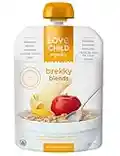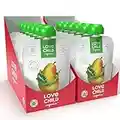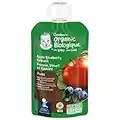As a caregiver, providing proper nutrition for your child's growth and cognitive function is crucial. Organic baby food has become a popular choice among parents for promoting children's health by averting harmful chemicals and additives. Our guide delves deep into the merits of organic baby food, tips for selecting the right product, and creating nutritious meals at home. Your baby will thank you for choosing Kitch's organic baby food!
Nurturing Your Baby with Organic Food: Understanding the Benefits and Importance
Every parent wants only the best for their little one, especially when it comes to their health. This is why more and more parents are turning to organic baby food. Packed with vitamins, minerals, and other essential nutrients, organic food can provide all the nourishment your baby needs to grow and thrive.
But what exactly makes organic food so special? Unlike conventional food, organic produce is grown without harmful pesticides and chemicals, meaning there are no harmful toxins in your baby's food. Plus, organic food is often fresher and more flavorful, making mealtime all the more enjoyable for your little one.
Elevate your baby's health and happiness with organic food - they'll thank you for it!
Choosing the optimum organic baby food for your little one.
Navigating the overwhelming range of choices in organic baby food can feel intimidating. But a few key factors can make the selection process a breeze.
Start by scrutinizing the label and ingredients. Look for products that carry a certification from a reliable organic organization.
Texture is also crucial. Depending on your baby's age, you may opt for smoother purees or chunkier meals. So it's important to select age-appropriate foods.
Finally, check whether the food is free from any allergens your baby may react to. These considerations will help you choose the ideal organic baby food with confidence.
Creating homemade organic baby food
Making organic baby food at home can be rewarding. Achieve complete control over ingredients with these essential tools and fresh, organic fruits and vegetables. Puree, refrigerate, or freeze it in an airtight container for future use. Don't forget to introduce new foods gradually to monitor potential allergens. Incorporate grains, dairy, and meat into your baby's diet for a well-rounded meal.
Nutritious Organic Foods Your Baby Can Enjoy
Healthy organic food options for babies include avocado, bananas, sweet potatoes, peas, and applesauce. These foods are brimming with essential vitamins and minerals that aid your baby's growth and cognitive development.
In addition, you can include rice cereal, yogurt, and pureed chicken or fish in your baby's meals. It's important to introduce new foods one at a time.
Creative Ways to Serve Organic Baby Foods
There's a myriad of ways to serve organic baby food to your child. Purees are an excellent choice for younger babies. As your baby grows, you can introduce more textured food, such as mashed or chopped ingredients.
You can also mix different fruits and vegetables to ensure your baby gets a variety of nutrients. Don't shy away from adding herbs and spices to enrich the food's flavor.
Ensuring Optimal Nutrition for Your Child
Here are some tips to ensure you're making the best decisions for your child's nutrition. Introduce new foods gradually and watch out for any allergic reactions. Wherever possible, choose organic food to reduce exposure to harmful chemicals.
Always be mindful of what you're feeding your baby. Opt for certified organic products and steer clear of foods with added sugars or artificial ingredients.
Conclusion
Providing high-quality nutrition for your little one is paramount for every caring parent. This is precisely why organic baby food makes for an exemplary choice. It’s free from harmful additives and is rich in all the essential vitamins and minerals that your baby needs to grow strong and healthy.
But with so many options out there, finding the right organic baby food can be quite the challenge. It takes careful consideration of multiple factors, including the ingredients, texture, and potential allergens, to make an informed and practical choice.
Crafting your baby’s meals at home using only the freshest ingredients takes things one step further. Not only does it give you full transparency over your baby’s dietary intake, but it also offers a bonding experience that you both will cherish.
When introducing your little one to new foods, remember to do it one step at a time and to keep an eye out for potential allergens.
By making the transition to organic baby food, you’re taking a critical step in safeguarding your child's growth, development, and overall well-being. It's truly a worthy investment that will benefit their future greatly.



